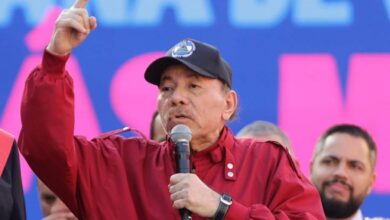Marlén Chow: The woman who challenged Daniel Ortega’s regime
On October 14, the activist, sociologist, and master of Public Health of 69 years, Marlén Chow became an icon of the resistance against Daniel Ortega. The incident occurred while Chow was arrested along with several women for demonstrating against the Ortega regime, calling for the release of political prisoners. At that moment he took out his lipstick to paint his lips.

Escucha este artículo
Leer en español: Marlén Chow: La mujer que desafió el régimen de Daniel Ortega
Then she asked her classmates to do the same. Minutes later, when questioned by the Orteguista Police about who had sent her or had paid her to reveal herself against the government, she replied: “I am from the Nicaraguan women’s association Pico Rojo”. The members of the Nicaraguan Police were completely confused to see them all with painted lips. Chow’s action not only raised the morale of her peers but leaked into social networks, and became a trend. The fact was documented by the newspaper La Prensa de Nicaragua.
In social networks, Nicaraguan men and women and some personalities expressed their full support, painting their lips using the #SoyPicoRojo numeral.
Desde hace tiempo que soy miembro de la asociación #PicoRojo y seguiré siendo hasta que Nicaragua sea libre y que liberen a todos los PresosPoliticos #SOSNicaragua #SOSPresosPolíticos pic.twitter.com/hLhEPlp7ZZ
— Bianca Jagger Nicaraguense por gracia de Dios (@BiancaJagger) 16 de octubre de 2018
#SoyPicoRojo porque no podemos seguir callando las injusticias, porque no pueden haber + presos políticos, porque no pueden callar nuestra fuerza ni determinación a punta de balas y porque no se debe seguir aceptando el abuso y las violaciones a la mujer en #SOSNicaraguapic.twitter.com/0FCMOo02MI
— Luis Enrique (@LuisEnrique) 16 de octubre de 2018
#SoyPicoRojo por una Nicaragua libre.pic.twitter.com/FnV3Pam8cE
— Yader Luna (@Lunacero) 16 de octubre de 2018
Marlén Chow, as reported by CNN, is a dissident of the Sandinista National Liberation Front (FSLN) political party, which fought against the Anastasio Somoza dictatorship that hit Nicaragua between the end of 1967 and 1979.
Read also: “We must recognize that the crisis in Venezuela was predictable and avoidable”: Angelina Jolie
Chow tells La Prensa that with less than 20 years she went from the Caribbean to the Pacific to study Economics. From that moment, after participating in student marches that asked for more budget for the National Autonomous University of Nicaragua and educational support to less favored in that university, her activism was born, which she has been practicing for more than 40 years.
Más allá del #PicoRojo Marlén Auxiliadora Chow Cruz, de 68 años, es oriunda de la Costa Caribe Norte, de un pueblito llamado Alamikangban, cabecera de Prinzapolka. De madre nica y padre chino. Participó en la lucha contra Somoza. Nos habló sobre su filosofía feminista @laprensa pic.twitter.com/MkNFAvFiBX
— Leonor AlvarezH (@LeonorAlvarezH) 18 de octubre de 2018
The human rights panorama in the Ortega regime
According to the BBC, “vandalism and terrorism”, among other crimes, accused 200 people, after capturing 38 “who had gathered in front of a shopping center in Managua to demand the release of the detainees by the government “. Among that total, 12 have already received sentences of between 15 and 24 years in prison. However, the violation of human rights is great, because they are people who do not agree with the way of governing Daniel Ortega and has manifested.
According to the Nicaraguan Center for Human Rights, the number of political prisoners in Nicaragua reaches 500. In addition, the 38 arrested are those who, for the Ortega government, violated their law of not demonstrating in the streets without consulting it first.
Although the Ortega government recognizes that in the protests that have been made against him only 199 people have died and that many were supporters of Daniel Ortega, agencies such as the Office of the United Nations High Commissioner for Human Rights and the Inter-American Commission on Human Rights that 512 are the deceased, giving as responsible for their death to the State of Nicaragua.




